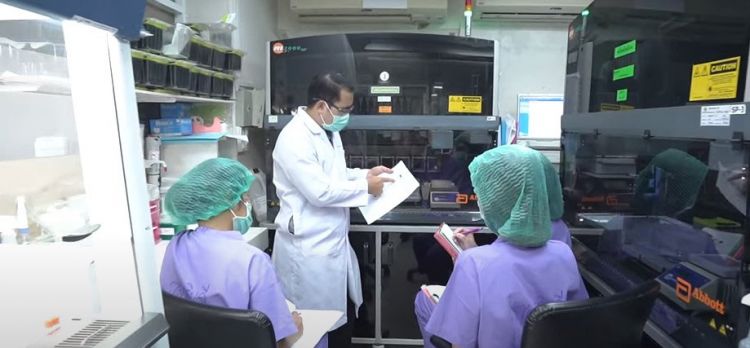World First Non-invasive Covid-19 Test

Sponsored by
In any pandemic, a central pillar of a public health system’s response is testing for the disease. Testing allows cases to be tracked and those who may have been infected to be informed and take appropriate precautions. In order to reduce the rates of transmission, it is important to make sure that testing for Covid-19 is as quick, convenient and widely available as possible. There has been a wide range of research into all aspects of improving Covid-19 testing, including a breakthrough from Faculty of Medicine Ramathibodi Hospital, Mahidol University.
Standard tests for Covid-19 use a Nasopharyngeal and throat swab, which is inserted deep into the nasal cavity. In addition to being very uncomfortable for the person being tested, this method can also cause them to cough or sneeze, which risks transmission to the medical staff taking the sample. This results in a number of problems; a high degree of Personal Protective Equipment (PPE) is needed by those performing tests, and needs to be changed between tests, in order to prevent possible transmission to medical staff or other patients. This process takes time and so reduces the testing capacity of hospitals and other test centers, and makes it difficult to perform mobile testing. Also, the invasiveness of the procedure can result in many false negatives, and make self-testing problematic.

A team of researchers, led by Dr. Ekawat Pasomsub, Chief of Virology Unit, Faculty of Medicine Ramathibodi Hospital, has developed the world’s first non-invasive test for Covid-19. This new testing method uses a saliva sample, instead of a Nasopharyngeal and throat swab, to identify those infected with the disease. It is much easier to take a saliva sample, and patients are able to produce and submit their own sample, making the testing process much more efficient. It is also possible to get the test results within 90 minutes, and the test has been found to have 87% sensitivity and 95% specificity.

In the next stage of the project, Dr. Pasomsub and his team will investigate the efficacy of pooling saliva samples prior to testing. If it is possible to pool the samples together and test the pooled sample, whilst still being able to identify which individual patients are testing positive, the cost of performing the tests will be a fraction of the current costs. This will help to support widespread and non-invasive testing across the world.